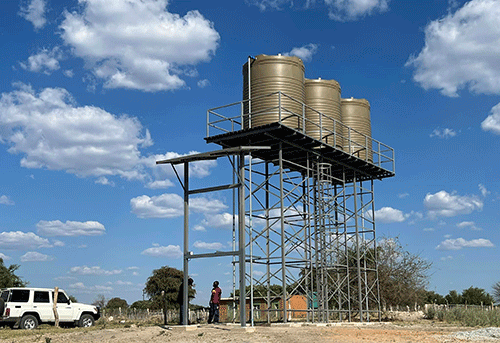THE International High-Level Panel on Water Investment Action Plan proposes an additional US$2 billion a year be mobilised from African governments to increase water security and sanitation, water minister Calle Schlettwein has said.
The minister said this yesterday while officially opening the panel discussion on the sidelines of the Stockholm World Water Week in Sweden.
He said while one recognizes the need for this ambitious plan and while the outcome of the UN Water Conference Action Agenda for Africa points in the right direction, the world is facing a three faceted crisis.
Schlettwein said: “We face the climate change crisis. The effects are now clearly visible with droughts and floods increasing in intensity, with out of season storms, intense veld fires and consequent flooding, unprecedented heat waves, glacier melting, rising ocean levels.
“All these climatic changes are having severe effects on the water cycle making secure water supply more difficult, more expensive and often out of reach for developing countries.”
He said shortfalls in the required funding to address climate change and related water cycle aspects remain significant.
He added: “Currently, the debt crisis, exchange trends and the weaponisation of the financial rules are fuelling inequality and making the future prospects for developing economies difficult.
“This is especially relevant for Africa with its youthful population where a conducive economic climate for quality economic growth and job creation is needed to ensure prosperity for our children.”
Schlettwein stated that nations are in a political crisis with war and that political instability is on the rise, adding that the multilateral system of the UN is seriously skewed and no longer fit for purpose as the majority of the global citizens are excluded from decision making.
“Our own AU lacks the decisiveness to address continental political instability. Economic and other resource scarcities increase the possibility of conflict and water scarcity is one of them. The ability to solve trans-boundary disputes becomes less likely when political instability is on the rise. After all, development is not possible without political stability,” he said.
The minister added that the ambition is to address and bring about safe, and secure water supply for all, to provide sanitation to enable development and decent urban and rural living standards for all are impacted on by these global trends.
The youth agenda played a pivotal role in his address, with Schlettwein saying the continent has potential filled with opportunities.
“Africa has massive opportunities. They include her enormous resource wealth including water, her potential to become the breadbasket of the world, her youthful population, her potential for green energy,” he stated.
In a recent memorandum of understanding between the Botswana University of Agriculture and Natural Resources and Namibia University of Science and Technology (Nust), on the establishment of the Southern African Science Service Centre for Climate Change and Adaptive Land Management (SASSCAL) research chair on water quantity and availability, Nust vice chancellor Erold Naomab said due to dry climatic conditions of countries like Namibia and Botswana, there is a need to ensure the limited water is available in sufficient quantities and quality.
The SASSCAL is a joint initiative of Angola, Botswana, Namibia, South Africa, Zambia and Germany in response to the challenges of climate change.
“Cooperation agreements are imperative to strengthen partnerships and create new opportunities and solutions, this chair will promote an integrated system of research, training, information and documentation on water resources quantity and availability,” highlighted Naomab.
He added this will support development and deployment of innovative, excellent and collaborative education and research at PhD degree level complemented by selected tailor-made training programmes for decision-makers and industry which speaks to the institution’s goal of capacity development and ongoing professional development.
- psiririka@nepc.com.na


